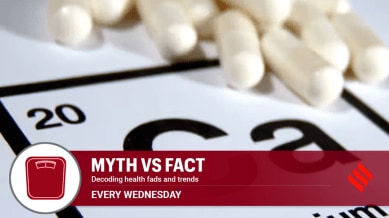Does your LDL or bad cholesterol go down when you take calcium supplements?
Lifestyle measures such as diet and exercise, alongside medications when needed, remain the cornerstone

Could the calcium supplement you are taking for bone health also help you manage your bad cholesterol (low density lipoprotein or LDL) levels and improve cardiovascular health? Some recent studies seem to suggest that calcium can be an effective secondary intervention to manage the excess load of harmful cholesterol.
“Numerous clinical trials and meta-analyses have investigated calcium’s influence on serum cholesterol and lipid profiles. Although results vary, some consistent patterns emerge. However, it is not a one-size-fits-all formula,” says Dr Rakesh Gupta, senior consultant, Internal Medicine, Indraprastha Apollo Hospitals, New Delhi. First, let’s understand the link.
How calcium supplementation might affect cholesterol
When calcium is consumed as a supplement, it can influence how the body processes fats and cholesterol. One primary mechanism is calcium’s ability to bind with fatty acids and bile acids in the intestine, forming insoluble compounds that reduce fat and cholesterol absorption into the bloodstream. This binding results in some dietary fats and cholesterol being excreted rather than absorbed, potentially lowering circulating lipid levels.
Research findings on calcium and cholesterol
Several studies indicate that calcium supplementation, particularly when taken at doses of 1,000 mg or more daily and over periods longer than 12 weeks, is associated with modest reductions in LDL cholesterol. This effect appears more pronounced in individuals without pre-existing lipid disorders. For example, a systematic review found that calcium supplements significantly reduced LDL levels, especially in people without dyslipidemia (abnormal cholesterol) and with longer supplementation durations.
The impact of calcium on HDL (high density lipoprotein or good cholesterol) is somewhat mixed, although some trials report a slight increase in HDL and improvements in the HDL/LDL ratio with calcium supplementation. Additionally, calcium supplements may significantly lower triglyceride levels by about 30 per cent, as observed in controlled trials where participants took 2 grams of elemental calcium daily for six months.
Changes in total cholesterol tend to be modest and sometimes statistically insignificant. Some studies report a small decrease in total cholesterol (5–7 per cent), especially among those not on cholesterol-lowering medications, while others find little to no overall effect.
Population differences and risks
The effects of calcium supplementation on cholesterol may differ in postmenopausal women. Some observational studies suggest an association between high serum calcium levels and increased cholesterol or triglycerides in this group, possibly due to estrogen deficiency affecting lipid metabolism. Some trial data hint that calcium supplements could elevate total cholesterol in postmenopausal women with existing dyslipidemia.
Similar concerns about potential increases in cholesterol and cardiovascular risk with calcium exist for men and certain high-risk groups, though data are inconsistent.
There is some controversy regarding calcium supplements and heart disease risk. While some studies raise concerns about calcium’s potential to contribute to arterial plaque formation, large-scale analyses have not definitively proven that calcium supplementation increases heart disease risk. However, the effects on cholesterol and cardiovascular health vary by individual risk factors, dosage and duration.
Calcium is best for bone, cholesterol needs separate management
Calcium supplements are not a primary treatment for high cholesterol but may provide a modest lipid-lowering benefit in certain populations, particularly those without established cholesterol-lowering therapy.
In people already taking cholesterol-lowering medications, calcium supplementation shows minimal additional effects on lipid levels. The decision to use calcium supplements should primarily consider bone health needs, with cardiovascular benefits or risks treated as secondary. Consultation with healthcare providers is essential, especially for people with cardiovascular risk factors or menopausal women.
For cholesterol control, lifestyle measures such as diet and exercise, alongside medications when needed, remain the cornerstone.